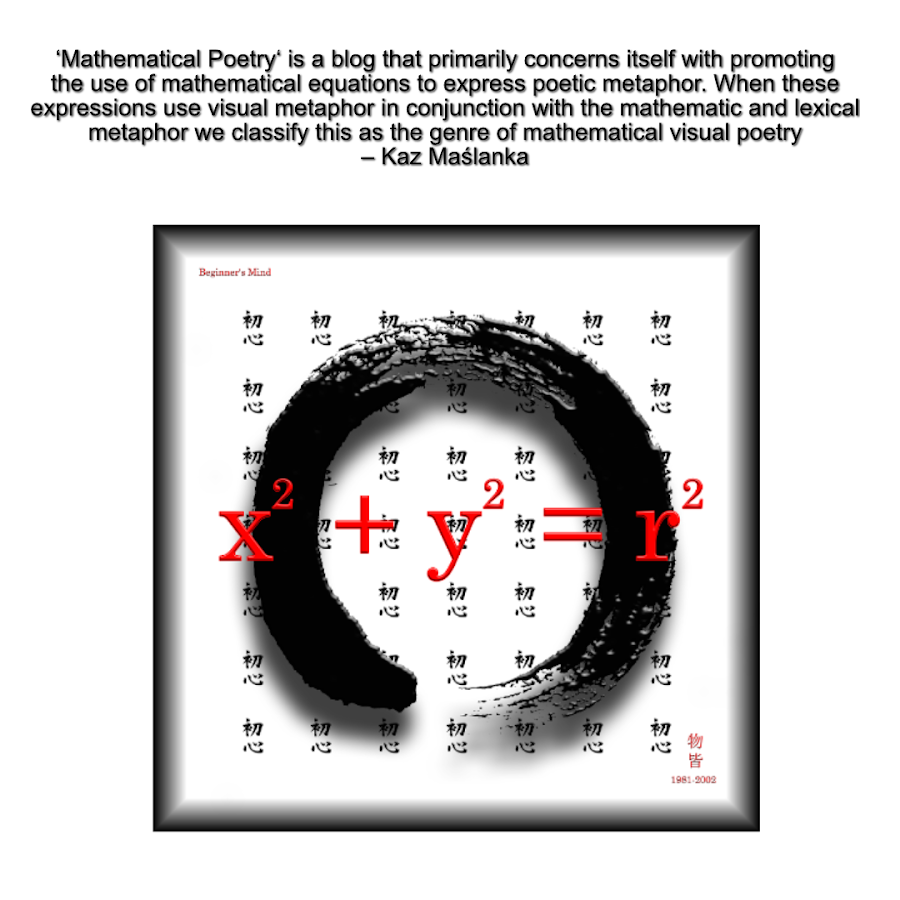
Bob Grumman has recently posted another mathpoem worth thinking about. Its history goes back to early March 2005 when Bob was blogging about his version of the Basho haiku which concerns a frog jumping into an ancient pond.
Bobs blog 401
Bobs version:
old pond--abruptly, the sound
of a frog's splash-in
on March 10 2005 Bob reveals that a math poet named El Konde had sent him his interpretation of that same Basho Haiku poem.
Bobs blog 403
Which was:
Old pond / silence = frog splash!
Bob replied, “I like the idea of dividing the pond (arithmetically), but it would be more logical, it seems to me, to divide silence by the frog to get the old pond.” Or:
Silence / frog splash! = Old pond
I would like to analyze these two different syntactical forms of the same Basho poem and see how they relate to Bobs recent poem “Mathemaku for Basho”
First of all we must talk about what takes place when we create and equation in the form:
A = B multiplied by C
When we multiply 2 subjects together those subjects are integrated into a new subject that has its identity is founded in both of the previous subjects.
Lets looks a something we are familiar with If you drive your car 100 miles down the Jersey turnpike from New York to Philly at 50 miles per hour you would get there in about 2 hours (assuming someone doesn’t shoot you for driving too slow)
Distance is equal to velocity multiplied by time. d = v t
The very idea of distance is founded on the ideas of time and velocity at least as far as our equation is concerned. It is also interesting to me that we can use different syntax to make this mathematical expression synonymous in three ways.
d = v t (Distance is equal to velocity multiplied by time.)
v = d/t (velocity is equal to distance divided by time)
t = d/v (time is equal to distance divided by velocity)
Now let’s look at El Konde’s version of the Basho poem:
old pond / silence = frog splash!
Which is mathematically synonymous with:
(silence)(frog splash!) = old pond
and
old pond/frog splash! = silence
What we have done is to integrate the break of silence with the frog splash to define the old pond. Or the (the break of) silence is defined as the old pond divided by frog splash Furthermore we could also read it as the old pond divided by frog splash! Defines (the break of) silence.
I realize that I have added my own interpretation to El Konde’s intention of ‘silence’ in his poem by redefining 'silence' as ‘the break of silence’ but I think it is arguable that Basho was talking about the break in silence as opposed to silence itself. I believe my addition makes El Konde’s version much more clear.
Now let’s look at Bobs change to El Konde’s Poem and its mathematical synonyms:
silence / frog splash! = old pond
silence / old pond = frog splash!
(frog splash!) (old pond) = silence
So what Bob expresses by his change is that the break of silence is defined by the integration of frog splash! and old pond or that the old pond is defined by the break of silence per frog splash and last but not least … frog splash is defined by the break of silence per old pond
Now that we have broke it down, you the reader can make your own decision on what version makes the most sense to you.
Note: (Bob’s intention may have been to think of 'silence' standing as itself, not as 'break in silence', but I doubt it especially since he has ignored it altogether in his new poem)
In conclusion lets look at Bob’s Mathemaku for Basho: http://comprepoetica.com/newblog/blog00691.html
(pond)(frog) = (((((((haiku)))))))
So it shows that Bob is consistent with multiplying pond and frog but he has 'defined haiku' as opposed to defining 'the break in silence'.
By putting parenthesis around the word haiku he has incorporated a vispo technique in his mathematical poem to imply splashing water waves.
So much for evolution,
R Mutt

No comments:
Post a Comment
Any Questions May Be Addressed To Kazmandu AT aol DOT com